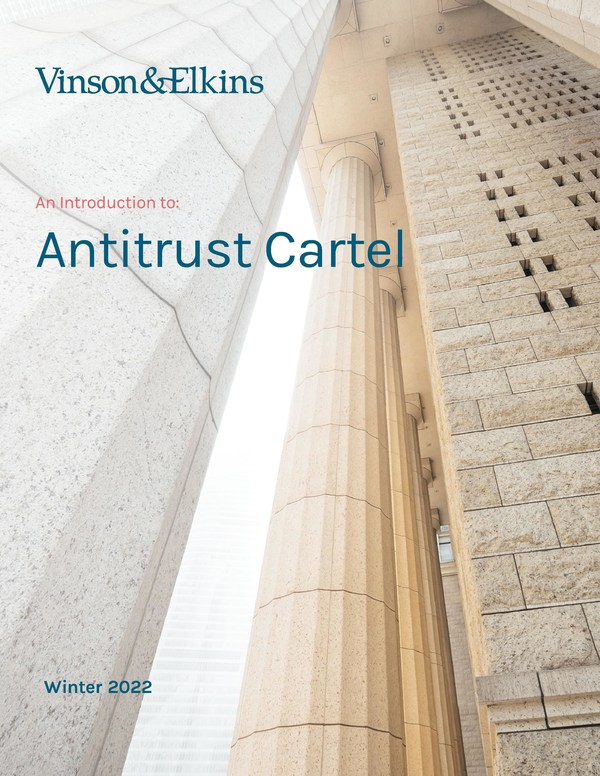WASHINGTON and SAN FRANCISCO, Dec. 9, 2021 /PRNewswire/ — Vinson & Elkins released today its Antitrust Cartel Primer which provides companies and individuals operating in today’s global environment with a practical resource guide to help them navigate cartel investigations and follow-on litigation. The primer is divided into two parts: part one details government investigations and part two covers the civil procedures for when an individual plaintiff sues for damages.
There is good reason for executives and their lawyers to hone their knowledge in the area of antitrust, specifically cartels. Cartel activity, price-fixing or bid-rigging between companies and other forms of market manipulation is a risk that is growing with great momentum. Key findings from the report include:
- From 2011 to 2020, the U.S. Department of Justice (DOJ) filed an average of 45 cases each year. While there was a general downward trend in criminal cases filed, the change in administration suggests there is likely to be a revival in enforcement. The Antitrust Division has requested a 13% increase to its budget ($88.5 million). Thus far in 2021, the Antitrust Division has filed more than 15 criminal antitrust cases.
- Between 1970 and 1999, roughly 40% of defendants in criminal antitrust cases were sentenced to prison time, yet that percentage is closer to 64% in the last twenty years.
- While executives may not end up in jail, their companies may still exact a price. As of December 2021, the Antitrust Division has imposed approximately three dozen corporate fines of $100 million or more and 13 fines of $300 million or more.
- The DOJ’s criminal enforcement efforts target individuals three times more often than they do corporations. Between 2008 and 2020, the DOJ prosecuted 620 individuals and only 226 corporations.
- The U.S. government, which has become increasingly aggressive in its investigation of antitrust and other matters, commonly starts an investigation by sending FBI and/or other federal agents to serve a search warrant. It is now common that the DOJ will work in tandem with foreign prosecutorial agents, particularly in the European Union, Japan, Korea, Canada and Brazil. In significant cases, these governments will attempt to execute simultaneous raids in the U.S. and overseas.
“With the recent changes in the administration and a heightened focus on antitrust in general, we expect to see an increase in prosecutions in the area of cartels,” said Craig Seebald, partner and co-head of litigation at Vinson & Elkins. “The DOJ is expected to look more closely at anti-competitive behavior and open new grand jury investigations. Regardless of their industry, companies need to understand the cartel rules when operating in the U.S. It’s imperative that they take steps to mitigate risks of enforcement and consistently educate their sales, strategy, HR and other staff members as to what is allowable behavior.”
“This Primer grows out of our work defending companies over the last 20 years in some of the largest and most complex cartel cases,” said Matt Jacobs, partner and co-head of the firm’s White Collar practice. “We have been able to get great results for our clients, and wanted to share some of our strategies with a broader audience.”
“Companies operating in the U.S. and abroad need to be aware of the intricacies of how the DOJ enforces violations of cartel laws,” said Darren Tucker, chair of Vinson & Elkins’ antitrust practice group. “Violators of antitrust laws are subject to significant financial penalties and criminal sanctions. The DOJ has imposed total criminal fines and penalties exceeding a billion dollars in some recent years, and we frequently see prison terms of two years or more for individuals.”
The primer illuminates the policies in place to help companies avoid breaking the law in the first place and those to mitigate potential problems that they may face if they are accused of wrongdoing. Perhaps most valuable to in-house counsel, the Cartel Primer provides practical guidance regarding the steps involved in a government investigation and potential steps companies under investigation or prosecution should consider. It also describes the process and potential strategic considerations should a company under investigation be a party to a “follow-on” civil proceeding by private plaintiffs.
For more insights and to see Vinson & Elkins’ full Cartel Primer go to:
https://www.velaw.com/insights/winter-2021-2022-antitrust-cartel-primer
About Vinson & Elkins
For more than 100 years, Vinson & Elkins has provided deep experience in handling transactions, investments, projects, and disputes worldwide. The firm is a trusted adviser to clients in the most important industrial and digital industries. Learn more by visiting www.velaw.com or follow us on Twitter @VinsonandElkins or connect with us on LinkedIn.
For more information, please speak with our media contacts.


